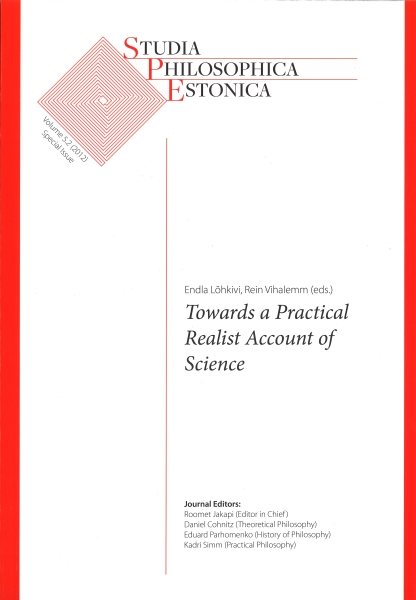(Anti)Hermeneutical Philosophy for Science
DOI:
https://doi.org/10.12697/spe.2012.5.2.07Keywords:
hermeneutical philosophy of science, neopragmatism, philosophy of scientific practices, Heelan, Ginev, RouseAbstract
Philosophical hermeneutics claims that human understanding, while being contingent and historical, is likewise universal and bears within itself some pervasive features detectable via hermeneutical analyses of historically imparted tradition and language. Similarly, hermeneutical philosophy of science is confident that hermeneutical methods are the only proper tool to adequately assess, reconstruct, explain or give a meaning to historical but universal scientific knowledge and its various forms. I point out two versions of hermeneutical philosophy of science and argue that whenever philosophical hermeneutics pursues rescuing "scientificity", human rationality, human rights, common values, and so forth under the pretence of its universality and competence, it necessarily transcends and violates the tenets of its own. I conclude in the favour of moderate interpretation of practical hermeneutics, perhaps in the very essence of it rest postmodern concepts of historicality, transparency and tolerance, without which there is no possibility of extricating oneself from hermeneuticism.Downloads
References
Crease, R. (1997). Hermeneutics and the natural sciences: Introduction, Man and World 30: 259-270.
Fuller, S. (2003). The unended quest for legitimacy in science, Philosophy of the Social Sciences 33: 472-478.
Ginev, D. (1998). Rhetoric and double hermeneutics in the human sciences, Human Studies 21: 259-271.
Ginev, D. (2005). Against the politics of postmodern philosophy of science, International Studies in the Philosophy of Science 19: 191-208.
Ginev, D. (2006). The Context of Constitution: Beyond the Edge of Epistemological Justification, Springer.
Ginev, D. (2007). A (post)foundational approach to the philosophy of science: Part ii, Journal for General Philosophy of Science 38: 57-74.
Heelan, P. (1997). Why a hermeneutical philosophy ofthenatural sciences?, Man and World 30: 271-298.
Heelan, P. (1998). The scope of hermeneutics in natural science, Studies in History and Philosophy of Science 29: 273-298.
Heelan, P. and Schulkin, J. (1998). Hermeneutical philosophy and pragmatism: A philosophy of science, Synthese 115: 269-302.
Mickunas, A. (2007). Permanency and Flow: Outlines of Phenomenology of Culture, KFMI, Vilnius. in Lithuanian.
Rorty, R. (1979). Philosophy and the Mirror of Nature, Princeton University Press, Princeton.
Rouse, J. (1991). The politics of postmodern philosophy of science, Philosophy of Science 58: 607-627.
Rouse, J. (1996). Engaging Science: How to Understand its Practices Philosophically, Cornell University Press, Ithaca.
Rouse, J. (2002). How Scientific Practices Matter: Reclaiming Philosophical Naturalism, University of Chicago Press, Chicago.
Warnke, G. (2003). Rorty’s democratic hermeneutics, in C. Guignon and D.R. Hiley (eds), Richard Rorty, Cambridge University Press, Cambridge.

